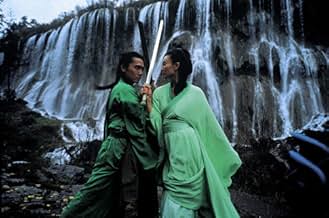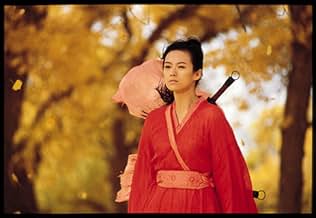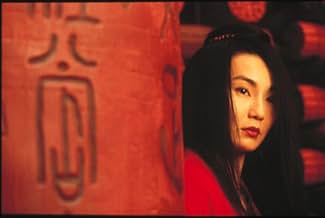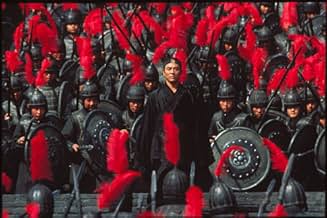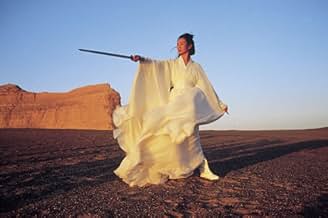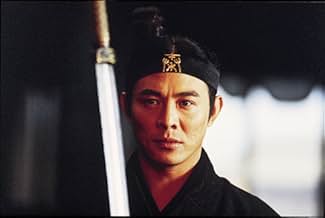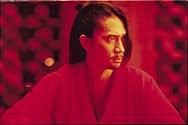Protégé par son armée, le Roi de Qin (l'unificateur de la Chine), semble hors d'atteinte de qui voudrait l'abattre. Mais pour avoir vaincu ses trois ennemis les plus redoutables, Sans Nom ob... Tout lireProtégé par son armée, le Roi de Qin (l'unificateur de la Chine), semble hors d'atteinte de qui voudrait l'abattre. Mais pour avoir vaincu ses trois ennemis les plus redoutables, Sans Nom obtient le privilège de l'approcher à 10 pas.Protégé par son armée, le Roi de Qin (l'unificateur de la Chine), semble hors d'atteinte de qui voudrait l'abattre. Mais pour avoir vaincu ses trois ennemis les plus redoutables, Sans Nom obtient le privilège de l'approcher à 10 pas.
- Réalisation
- Scénario
- Casting principal
- Nommé pour 1 Oscar
- 46 victoires et 48 nominations au total
- Broken Sword
- (as Tony Leung Chiu-Wai)
- Flying Snow
- (as Maggie Cheung Man-Yuk)
- Moon
- (as Zhang Ziyi)
- King
- (as Chen Dao Ming)
- Scholar
- (as Liu Zhong Yuan)
- Old Servant
- (as Zheng Tian Yong)
- Commander
- (as Zhang Ya Kun)
- Seven Qin Guards
- (as Hei Zi)
Avis à la une
First, there are scenes of haunting beauty("Duel in the yellow forest" and "Turquoise autumn" to site a couple) that, like the best of impressionist paintings, are so affecting that you will forever see the world in a slightly different way having once beheld them.
Secondly, the overall message of the film is a provocative one. The claim is that a degree of human casualties and suffering may be the optimal path to a better world, especially when the alternative is equally brutal chaos. This is not a popular theme. It has become much more fashionable to be anti-war in all cases. And understandably so, since variations of this logic have often been used in the past to justify atrocities. But the film provides a crisp litmus test for avoiding delusion: action must be taken with a heart void of malice and an unwavering commitment to the broadest possible ultimate outcome of good for all. Can anyone live up to this standard? Several characters in the movie do, each in their own way. If the standard could be met, would the world be a better place? These are questions worth reflecting on that have not been dealt with, to this depth, in any film I'm aware of.
I was told Hero was the most expensive movie China had ever made (at that time), and in this case, the money went to good use. With its superb direction, cinematography, and soundtrack, this film will certainly stick out among the typically fast-paced, action-heavy films from China.
One thing that will stand out about this film is its use of color, which many of its reviewers rightfully praised. Without spoiling anything, how color is used to tell this story is both visually beautiful and psychologically intriguing. Combined with its incredible soundtrack, it will very likely have artistically-inclined viewers agape and speechless. In the very least, "Hero" is a feast for the senses-like a fireworks show of color and sound. At its best, it is a wonderful story about nationalism, self-examination, and love which is told in an unusually beautiful fashion.
As many will tell you, if you liked "Crouching Tiger, Hidden Dragon", you're likely to enjoy this just as much-especially if you liked the quieter, more introspective scenes in that film. Because there is so little to compare it to, "Hero" is a difficult film to review. However, that only gives you another reason to give it a chance. And finally, it must be said that this is Jet Li at his very best.
First of all, I noticed heavy use of Daoist symbols. The five elements were used - one per fight - fire, wind, water, wood, and metal. A message in the film seemed to show the Daoist idea that the harder you try, the worse you do, as Moon did in her fights. On the other hand, if you can go with the Dao (think: Use the force, Luke), you will succeed.
Second, I did not know before watching the film that it was Zhang Yimou's. His films are often critical of the Chinese Communist Party and sometimes have deep allegorical meaning. Some of his films are banned in China. Hero, on the other hand, seemed to be intensely nationalistic. Lately in China, the communist government has promoted nationalism (instead of populist Communist values as they did pre-1976) with a great degree of success. The use of the word "Tianxia" (literally "all under heaven," translated in the movie was "Our Land") seems Confucian and nationalistic at the same time. Although I would have not guessed this film was by Zhang Yimou from the plot or message, the cinematography was unmistakable. Hero eerily reminded me of another film, Yellow Earth (Huang Tudi), which Zhang Yimou did not direct but for which he did the cinematography.
Third, historically, Hero lacked in a few very obvious places. The Qin Emperor, Qin Shi Huang, was legendary for his fear of death and his Machiavellian rule. When his character states that he no longer fears death because of Broken Sword's words and invites Nameless to kill him, he is entirely breaking with the true historical figure of the emperor. Remember, this is the emperor who built an entire terracotta army to protect him from his enemies in death and spent a lot of money and effort looking for the secret to reach immortality. He was known for a Confucian philosophy spin-off known as Legalism, which is very similar to Western Machiavellianism. While his quick mind (or his advisor's) might have figured out Nameless's plot, he would never have hesitated in executing him.
Overall, this seems like a break from the usual genre one would expect from Zhang Yimou. I am not sure exactly what message he is trying to convey with this film, other than an endorsement of Chinese nationalism and perhaps Daoism as well.
Overall, I didn't think the story was that appealing except for the good message at the end, about the good of all being more important than satisfying one's personal vengeance. Well, who could argue with that? As for the rest, perhaps being a Westerner unfamiliar with Eastern culture, it's harder for me to relate to the mind-set. I would be interested to know how Asians viewed this story, as opposed to similar films.
Sometimes I think these wild Crouching Tiger-like action scenes are too long and overdone, but at least in this film they were very original and, once again, more visuals feasts than anything else. On my second viewing, I discarded the subtitles and went with the dubbed version to concentrate more on the stunning look of this film. It paid off. Even if I don't quite follow everything, each scene is such eye-candy that you can't go wrong viewing this.
Hero is two sides of a tale as presented by Nameless (Jet Li), a mere Prefect who defeated three deadly assassins, and the King of Qin (Daoming Chen), the man the assassins wished to kill. Nameless weaves his heroic though modest story of how he killed the assassins, but the King remains unconvinced, spinning his own version of how he believed events unfolded.
Director Yimou Zhang takes us through Nameless' story first, spreading the battle sequences thick, allowing them to take their own time. In the King's version, certain battles are then revised, which is remarkably brave considering that some battles are utter fabrications. In one such fictitious fight, in a faultlessly designed set, Nameless and Sky (Donnie Yen) close their eyes and fight out the battle within their minds. Screen time is being spent lavishly on showing how two characters contemplated a fight, whilst fighting each other in a battle that never occurred. It is confusing certainly, but perhaps Zhang wished for his audience to get lost in the plot's design so that they would not question the warrantability of half of the battle sequences, which make up most of the film.
Yet, it is difficult to ponder these details when they are made so utterly insignificant when viewing such a spectacle. The sheer beauty of the battles, the gentle floating of the assassins as they fly around their arenas (which range from a forest full of orange leafed trees, crisp leaves falling down to the ground like rain, to the crystal clear and calm of a mountain lake), the costumes of characters at varying stages in the story line (red for passion, green for youth, white for truth, blue for love), the amazing army scenes which feature thousands of arrows being fired into the sky to create a black cloud that descends right on top of the camera, all these elements combine to produce a faultlessly perfect image on the screen, each frame a worthy photograph that gently reminds you why cinema is the greatest art form of the twentieth century.
And characterisation is not lost in this beauty as one may have feared. Despite the irritating two dimensional performance of Zhang Ziyi as Moon, the other actors carry off fine performances, especially Tony Leung Chiu Wai as Broken Sword and Daoming Chen as the King. Their performances are especially credible as they are often drowning in the memories of the King and Nameless - they need to change slight mannerisms in order to reflect whose mind they are now in.
The script too is of an impressively high standard. The moments of clarity that the warriors feel are experienced by the audience also, and there are some very informed outlooks of the emptiness of warfare, communicating that to achieve peace, sometimes war is the only option. These messages of course seem fitting in our current times, underlining how ancient some of the methods of our governing body truly are.
Hero is undoubtedly a most beautiful and awe inspiring film. What it lacks in plot substance, it makes up for with structure and script. It elaborates on the ground work created by 'Crouching Tiger' and is an experience that I would encourage you to seek out, as long as you are willing to submit to the film and let it guide you through its world on its own terms.
Rating: 4/5
Le saviez-vous
- AnecdotesThe "red fight" between Moon and Flying-Snow was filmed in a forest in Mongolia. Director Yimou Zhang had to wait until the leaves turn yellow, and hired local nomads to gather even more yellow leaves in order to cover the ground completely. In fact, he was so fanatic about the leaves, that he had his crew separate the leaves into four different "classes" which were each put at increasingly farther lengths from the camera.
- GaffesAt the beginning of the movie, subtitles state that China was divided into seven warring states. At the end, the subtitles then state that "the King of Qin" unified China, without specifying which one. Historically, the king that was the one to unite all of the Chinese states was Ying Zheng (later changed name to Shi Huang Di) who inherited the throne from his deceased father at age 13 (as opposed to the age of the king in the movie). At the time, Ying Zheng began to rule China, the seven states were already reduced to two larger states (Qin and Chu) which was later dominated by Qin when Ying Zheng was 22 years old. It is therefore impossible for the same king shown in the movie to be the king that united all the Chinese states, although the end-note is semantically correct.
- Citations
King of Qin: I have just come to a realization! This scroll by Broken Sword contains no secrets of his swordsmanship. What this reveals is his highest ideal. In the first state, man and sword become one and each other. Here, even a blade of grass can be used as a lethal weapon. In the next stage, the sword resides not in the hand but in the heart. Even without a weapon, the warrior can slay his enemy from a hundred paces. But the ultimate ideal is when the sword disappears altogether. The warrior embraces all around him. The desire to kill no longer exists. Only peace remains.
- Versions alternativesThe Director's Cut was 107:15 minutes, compared to the theatrical version at 96:23 minutes.
- ConnexionsEdited into Ying xiong: Cause - The Birth of Hero (2002)
Meilleurs choix
Détails
Box-office
- Budget
- 31 000 000 $US (estimé)
- Montant brut aux États-Unis et au Canada
- 53 710 019 $US
- Week-end de sortie aux États-Unis et au Canada
- 17 800 000 $US
- 29 août 2004
- Montant brut mondial
- 177 395 557 $US
- Durée1 heure 47 minutes
- Couleur
- Mixage
- Rapport de forme
- 2.35 : 1
Contribuer à cette page





